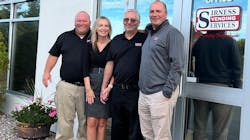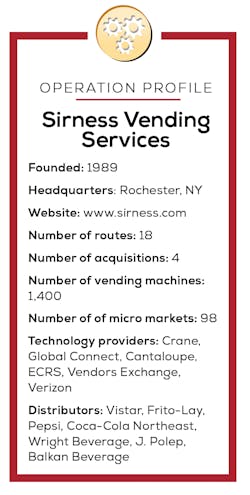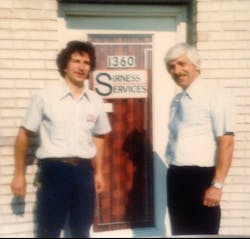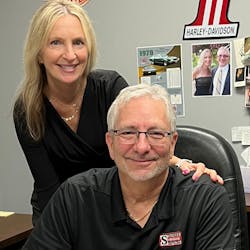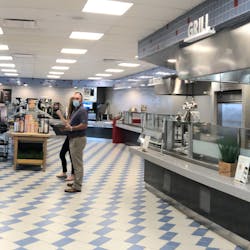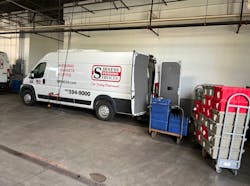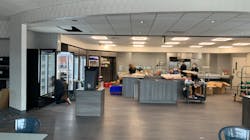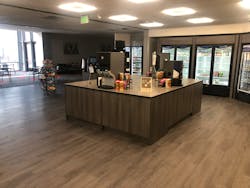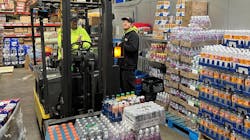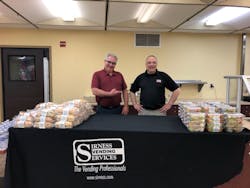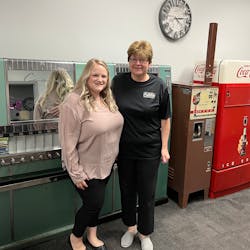Sirness Vending Services wins a loyal following in western New York
Sirness Vending Services prides itself on having many loyal customers who have spanned decades. The winning formula? Its high standard for exceptional service gleaned over three generations and its commitment to continually invest and adapt to changing times and technologies.
ARA Services only provided office coffee service where its vending accounts required it. The sole competitor at that time was Cory Coffee Co., which only shipped coffee via UPS. In-person service was limited to fixing machines when necessary. ARA Services then launched ARA Coffee Systems with a similar business model. Seeing an opportunity and the potential, Nesser Sr. decided he could provide a superior, more personalized service on his own, and Sirness Services was born.
“My dad asked me to join him in launching his idea,” Nesser recalled. “I wanted to join the Air Force and be a pilot, and dad said if this didn’t work out, Uncle Sam would always take you. Now 45 years later, it turns out he was right, here I am!”
They grew the company to six coffee routes and two vending routes. They decided to split the company into two divisions, Sirness Coffee Services and Sirness Vending Services in 1989.
When Nesser Sr. died in 2011, his nephew and right-hand man, Mark Wahl, began running the OCS operation. The two divisions have continued to work together serving all accounts with complete office and breakroom refreshment solutions.
“As accounts grew, we grew with them,” Nesser recalled. “We’ve had some for 35-plus years. They’d open a plant in Buffalo, and next thing you know, we are in Buffalo. It’s been a slow, steady growth led by serving our customers and trying to say yes at every opportunity.”
Another significant opportunity for expansion came when Sirness purchased the vending business from a regional ice cream manufacturer that operated 150 machines. “That led us to cover the entirety of western New York, and we’ve partnered with several other companies along the way,” said Nesser. “We always foster local relationships, local restaurant products, traditional retail partners. Our USDA-certified commissary partner is based here, and all our fresh food is produced by them. We source our coffee from a local roaster.”
Representing Sirness Vending’s third generation is Nesser’s stepson, Tom Bach, who worked in the family business part-time throughout college and learned the business from the ground up and joined full time when he graduated. Eighteen years later, he is now Sirness’ vice president and general manager. Also included is Larry Bach, who serves as operations manager, and Shawn Myrick, Nesser’s son-in-law, is involved as a route supervisor.
The upstate New York operation, headquartered in Rochester, has 18 vending and micro market routes that cover a 12-county radius spanning its reach to Syracuse, Buffalo, Rochester and Utica and everywhere in between. The facilities encompass 40,000 square feet.
Like all convenience service providers, Sirness Vending took a hit from the COVID-19 pandemic, but it is embracing the opportunities that remain and have emerged rather than lamenting over lost business.
Technology driven
The operators credit Sirness Vending’s adoption of technology early on and continued investment in it as it has advanced for easing the impact of the pandemic.
“We invest in technology because it allows us to provide customers with the latest, most meaningful services and to run our business most efficiently and profitably,” Bach stated. “From vending machines set to accept payment from mobile devices to pick-to-light systems that reduce errors in the warehouse by automating product picking for deliveries, we are well-equipped for today’s demanding business needs.”
Implementation of LightSpeed Automation’s pick-to-light warehouse automation system was the final step to get away from the age-old “rolling warehouse” model of service.
The move also supported Sirness’ commitment to food safety every step of the way for fresh foods in its vending machines and increasingly in its growing roster of micro markets. “You won’t see picnic coolers or partially cooled compartments on our trucks,” Nesser emphasized. “We want to ensure the temperature of food is kept constant and cool. Food safety is nonnegotiable.”
Telemetry and iPads for route drivers that tie into its VendMax vending management system to facilitate just-in-time service with just the right products were the next logical steps to stay ahead of the curve.
Nesser added, “We are so thankful that we had the technology in place before the pandemic so we were not running all over the place over-servicing and bringing home empty money bags. We know what the worst of the worst is thanks to the pandemic, and we managed thanks very much to technology, and we can only build upward from here.”
Micro market migration
Before the pandemic, micro markets were on a steady upward trajectory for Sirness, and for the industry at large, and the trend continues for the self-checkout stores to replace vending machines.
“Micro markets are the clear choice by employees for their open shelves, racks and unlocked coolers and greater number of selections and the ability to examine items before purchasing,” Bach commented. “But they’re also a way for employers to show employees they are valued while keeping them on site and refreshed without costing the company the expense of a cafeteria. Employees love the enhanced options and workplace cafe feel of micro markets, making them valuable productivity boosters and retention tools.”
Conversions from cafeterias to micro markets accelerated with the pandemic, both by the need for social distancing and with workplaces having drastically reduced levels of employees on-site during these not-so-ordinary times.
“Maybe an account now has 200 people in the office on average versus 2,000 before the pandemic, with many hybrid on different days,” Bach noted. “They can no longer justify a cafeteria, but micro markets help bridge the gap by offering fresh food on demand.”
Local, fresh, quality and custom
Sirness offers a customizable fresh food program aimed to please. Its wide selection of options for vending, micro market and pantry service is made locally by a commissary partner under the Market Fresh by Sirness private label.
In western New York, the birthplace of Buffalo wings, customers clamor for hot Buffalo chicken subs with bleu cheese dressing – hold the ranch.
Freshly made personal pizzas with pepperoni (the always-available favorite topping), and a monthly rotating special topping, Philly cheesesteak and breakfast pizza are other popular sellers. Lighter-fare fast movers include fresh salads, wraps and unique mixes of fresh-cut fruit like pineapple and strawberries with yogurt dip.
Sirness’ commissary partner flushes nitrogen in the packaging for its fresh foods, which provides a seven-day shelf life that is key to provide such a diverse menu of fresh options in micro markets and vending, said Nesser.
“Fresh food is now in demand in blue-collar and white-collar locations alike, versus pre-made, prepackaged items,” Bach reflected. “Blue-collar workers work longer hours in many cases than they used to and have more money in their pocket and need a good meal. A wedge sandwich and a bag of chips doesn’t cut it anymore. They want fresh and bigger and are willing to pay more in micro markets and vending machines.”
Sirness recently upped its fresh food game by adding warmers to its micro markets to serve grab-and-go hot foods, with impressive results.
“They can grab a hot breakfast sandwich ready to go,” Bach said. “It smells great and attracts people. We’re definitely looking to expand more hot food into our markets as they continue to grow in popularity.”
Extra perks
Many locations take the amenity of a micro market a step further and reward employees by subsidizing their purchases, partially or completely. Especially since the pandemic and with a tight labor market, many employers incentivize employees to come into the office by offering a credit for perfect attendance.
“We promote to the client to use it as one more tool in their toolbox to attract employees and get them back in person, since everyone loves free, good quality food and snacks,” said Bach.
And, where micro markets are not subsidized, Sirness is finding employees across the board more willing than ever to pay a premium for freshly made foods on-site.
Sirness has seen an overall shift toward more revenue coming from manufacturing-based locations since workers in these sites can’t work remotely and employers are doing all they can to reward them for showing up in a tight labor market.
“It had been more of an even mix of public, white- and blue-collar, amusement,” Nesser said. “It has shifted back more heavily to more traditional manufacturing. Pre-pandemic, we did a lot of pantry service and then it fell off completely. Now in a tight labor market, to the credit of our sales team pointing out the value of pantry service to retain and attract talent, we’re seeing a lot of clients choosing to offer it not only in the traditional white-collar locations but also in manufacturing sites.”
Sirness Coffee Services was the division hit hardest by the work-from-home movement resulting from the pandemic. What was four routes pre-pandemic was immediately reduced to two, but the business is slowly rebounding as employees return.
Bean-to-cup and portion pack single-cup brewers that allow employees to choose from dozens of coffee-based drinks at the press of a button have been the trend for years and are especially popular to please the varied tastes of unpredictable mixes and headcounts of hybrid workers on demand from day to day.
These types of brewers, featuring locally roasted fresh-brewed coffee are also a popular way to deliver quality, coffeehouse-caliber hot beverages around-the-clock in micro markets. “It gives a micro market-plus kind of feel, especially for those who have converted from vending, to have coffee too,” Nesser commented.
Tried-and-true vending
The pandemic reduced Sirness’ vending machine count from 2,000 to its current 1,400 in operation, but the silver lining is that while many were no longer needed, others were replaced by micro market conversions, which is decidedly a win-win for the operator and its customers. The company has nearly 100 micro markets in operation ... and counting.
“We know the state and federal nutritional rules and regulations for serving healthy vending machine items in area schools, and we offer various solutions,” said Bach. “We believe in providing the very best refreshment to schools that follow all guidelines, for each level of school from pre-K all the way to universities and tailor the better-for-you snacks and beverages to meet the needs of students, teachers, athletes and guests.”
Customer-facing technology is equally important to Sirness as the backend operational tools that enhance and drive its efficiency. All of its vending machines offer the convenience of credit, debit and mobile payment. If an issue arises, the company’s customer service department is open 24/7 to address it.
Sirness Vending’s My Vending Rewards program lets employees get cash back rewards on vending machine purchases. For every item from a vending machine that employees purchase, they earn points toward free products, such as “For every fourth purchase, get one free” promotions. When employees register, they can also designate a charity to receive a percent for each dollar spent.
Employers can opt for the Sirness Wellness Promotions program to incentivize healthier selections in both vending machines and micro markets. Employees earn loyalty points to use toward future product purchases and participate in custom promotions designed to improve awareness of corporate wellness initiatives, lower healthcare costs and reward healthier eating and drinking.
Employers can also “buy-down” the price of the healthier options, adding an extra incentive to purchasing those items. For micro market customers, Sirness can also create custom promotions through the Sirness Market Account card so employees can win prizes or discounts on product purchases.
Whether it’s a vending bank or a micro market, Sirness takes every opportunity to make a fanfare over every grand opening with discounted food, raffles and giveaways.
Full force
The Sirness team is back to being fully staffed with 45 vending employees, and six on the coffee side of the business, powering ahead. Only a few vending and micro market employees left during the pandemic through natural attrition, but Sirness was forced to downsize its OCS staff to adjust to the impact of lost business.
And stepping in as the company’s fourth generation, Tom and Barbie Nesser’s two oldest grandchildren, Emma and Nate Bach (both high schoolers) work in the office during summer vacation and holidays.
“The most rewarding thing of all to me is that we have four generations of family here – with what started as a little operation in my dad’s garage,” Nesser said. “It’s an honor that each generation is willing to come to work here and be involved with the family business. They bring their energy, skills and their personalities. So many operators sell to national companies and then the legacy is over. I’m so pleased another generation is interested.” ■
About the Author
Emily Cambriello
Emily Cambriello is a business journalist who has devoted much of her career to covering the convenience services industry. She is a contributing editor to Automatic Merchandiser/VendingMarketWatch.com.
